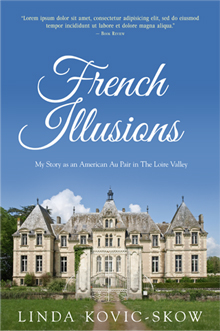My Memoir, French Illusions, took me three years and countless hours to complete. During that time, I studied and learned a lot about writing. I’m not an expert, but these are my five favorite writing tips.
1. It’s old advice, but so important. I strive to “show” readers what a character is doing rather then “tell” them.
Instead of “Monsieur Dubois was angry,” I wrote, “Glaring at his wife, Monsieur Dubois straightened up and turned toward me.”
Instead of “What time will you be home?” he asked, uneasily, I wrote, “What time will you be home?” he asked, his forehead wrinkled with unease.
2. When I come to the end of a chapter, I try to foreshadow things to come. I want my reader anxious to turn the page to find out what happens next. The following excerpt comes at the end of chapter 3 in my memoir.
Tapping the pamphlet against my lower lip, I pondered the differences between a larger more exciting city versus a smaller, quaint rural town. Both of them appealed to me on different levels. Songais offered me the opportunity to connect with the Dubois’s family, their relations, and townspeople on a personal level. Tours, on the other hand, presented prospects for friendships and romance while I studied French at the university.
My mouth slid into a subtle smile. I didn’t have to choose. I could have both. The possibilities were endless.
3. Descriptions have their place, but I’ve always loved “white space” on a page, so I dialog a scene whenever possible. A few expressive interjections enhance the conversations and make them more interesting.
Turning toward Alexandre, I tried out a new phrase. “Donne-moi une pâtisserie, s’il te plait.” Please pass the pastry.
Madame Moulon noticed and congratulated me on my progress with the language. “Mademoiselle Kovic, votre français s’améliore.”
“Merci beaucoup, madame,” I replied, glancing at my patron, eyes hopeful.
Madame Dubois opened her mouth, but no words of praise burst forth. Instead, she pointed to the teapot and asked me in English to pour her mother another cup of tea.
4. Visceral reactions, scattered throughout a book, adds depth. “Pulses race” and “guts tighten” when people get excited, frightened or angry.
Madame Dubois motioned us forward with her arm and we climbed the steps, stopping to rest on the first landing. When we reached the second, my stomach lurched as she grabbed the railing with one hand and her belly with the other.
5. Internalizations, when characters talk to themselves inside their minds, adds a personal touch to scenes.
For a moment, I was speechless, thinking: How many times has she told me this already? She was treating me like an irresponsible teenager and it was unjustified. “I’ve been very careful, so maybe there’s another explanation?” I said, struggling to keep my voice from cracking.
Perhaps you have a few writing tips of your own to share? I would love to hear them.

Speak Your Mind